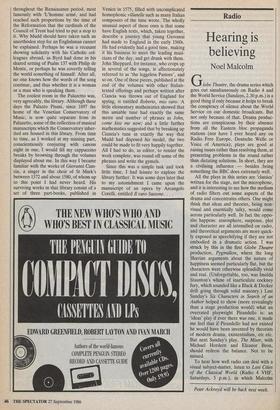Radio
Hearing is believing
Noel Malcolm
Globe Theatre, the drama series which goes out simultaneously on Radio 4 and the World Service (Sundays, 2.30 p.m.) is a good thing if only because it helps to break the conspiracy of silence about the World Service on our domestic broadcasts. But not only because of that. Drama produc- tions are conspicuous by their absence from all the Eastern bloc propaganda stations (nor have I ever heard any on Radio Free Europe, Deutsche Welle or Voice of America); plays are good at raising issues rather than resolving them, at presenting problems in the round rather than dictating solutions. In short, they are a civilising influence — besides being something the BBC does extremely well.
All the plays in this series are 'classics' written for the stage, not the microphone, and it is interesting to see how the medium of radio filters out some aspects of the drama and concentrates others. One might think that ideas and theories, being non- visual and essentially talky, would come across particularly well. In fact the oppo- site happens: atmosphere, suspense, plot and character are all intensified on radio, and theoretical arguments are more quick- ly exposed as speechifying if they arc not embodied in a dramatic action. I was struck by this in the first Globe Theatre production, Pygmalion, where the long Shavian arguments about the nature of happiness seemed particularly flat, but the characters were otherwise splendidly vivid and real. (Unforgettable, too, was Imelda Staunton's whine of inarticulate cockney fury, which sounded like a Black & Decker drill going through solid masonry.) Last Sunday's Six Characters in Search of an Author helped to show (more revealingly than a stage production would) what an overrated playwright Pirandello is: an `ideas' play if ever there was one, it made me feel that if Pirandello had not existed he would have been invented by theorists of modern drama, existentialism, etc etc. But next Sunday's play, The Miser, with Michael Hordern and Eleanor Bron, should redress the balance. Not to be missed.
To hear how well radio can deal with a visual subject-matter, listen to Lost Cities of the Classical World (Radio 4 VHF, Saturdays, 5 p.m.), in which Malcolm Billings and Professor Jonathan Riley- Smith visit mined Greek and Roman cities in the eastern Mediterranean and ponder their rises and falls. The recipe is simple they just go there and describe what they see, with the addition of some scholarly observations from the Professor, and a few huffs and puffs if he has just climbed a rampart or a tumulus — but it works perfectly well, and the mental picture one gains of each place is clearer than any number of glossy, all too forgettable photographs.
I was going to devote the rest of this article to the spate of new educational programmes which marks the start of the school year on BBC radio. But I've been waylaid instead by a quasi-informative programme which struck me as setting a new standard of intellectual shoddiness. Entitled Dreamflower and the Toadskin Spell, it was broadcast on Tuesday, re- peated on Wednesday and re-hashed in the Listener on Thursday. Amid all the current media campaigns against drug-taking, it was a little surprising to hear a pro-drugs programme on Radio 4. Written by a Mr Monbiot and largely featuring a clownish academic called Rogan Taylor, it had two main aims: to prove that much of our folklore is derived from primitive shaman- cults involving hallucinogenic drugs, and to inform us that we are taking narcotics all the time in our normal diet. Of course the script was full of dutiful little provisos about not taking harmful quantities. But there can be no doubt how the man on the Clapham omnibus would interpret the drift of this sentence, for example: 'The next time that, lounging in the public bar, you begin to get self-righteous about the moral delinquency of smoking cannabis, consider the fact that the hemp family has only two members: cannabis and hops.' I would expect any moderately intelligent 12-year- old to be able to analyse the fallacy in that sort of reasoning, if one can call it such.
The start of the show, Mr Taylor of Lancaster University, is 'researching into' the history of religion. His researches enable him to show that almost anything must originally have been a toadstool. Santa Claus, for example, is red and white and flies through the air: therefore he is a fly agaric mushroom. Aladdin's lamp is more problematic, but, says Mr Taylor, with the air of letting us into a secret, `lamps are associated in Near-Eastern mythology with toads, and toads are associated with toadstools.' Of course. Gradually, I found that I was associating Mr Taylor with a halfwit; but, as we all know, in Lancastrian mythology halfwits are associated with very great shamans indeed. At one point he quoted a non- existent line, addressed to Abel Drugger, from one of Ben Jonson's plays — he could not remember which. He also gave a long account of the Chinese rope-trick de- scribed by the mediaeval traveller Ibn Battuta (whom he mis-dated by a century). The magician climbed the rope with his assistant, cut him into pieces and then reconstituted him on the ground. This, said Mr Taylor, was an allegory of the experi- ence of shamanistic intoxication. I hap- pened to have a copy of Ibn Battuta on my desk as I listened to this, so I was able to spend a minute re-reading the original version while Mr Taylor told some funny stories about potatoes. Ibn Battuta does not present the story as an allegory; he is giving an eye-witness account of a perform- ance by a conjurer. And he concludes: `The qadi Afkhar ad-Din was sitting beside me, and he said to me: "By God, there was no climbing or coming down or cutting up of limbs at all. The whole thing is just hocus-pocus." '



























































 Previous page
Previous page